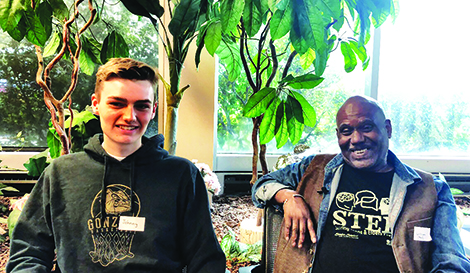Bridging the generational divides
On a Saturday morning at the Olympia Senior Center, Linda Terry, the founder of Sharing Teens and Elders Project (STEP), is welcoming longtime and new participants for the day’s events. Committed volunteers are putting out snacks and coffee while sneaking in praise for Linda’s unwavering dedication to bridge generations and foster a bond between elders and a caring group of local teens.
STEP, well into its fifth year, is a perfect example of intergenerational engagement — the primary reason why the program is featured as an Inspiring Community Connection in the 2018 edition of AARP’s “Where We Live: A Community for All Ages.†The third edition in the AARP series highlights inspiring ideas and solutions from local leaders to improve their communities, respond to pressing issues, and build relationships. STEP has also been honored as a Program of Distinction by Generations United, dedicated to improving lives through intergenerational collaboration.
“The program has evolved beyond my original vision,†said Linda. “When we started, the gatherings were pretty structured with group activities, but as we progressed, both teens and elders expressed a desire to just talk and share stories.â€
A myriad of studies tout the benefits of intergenerational interactions for older adults as a way to decrease loneliness and isolation, a chronic and increasing phenomenon which has a marked effect on health and well-being. Older adults with opportunities for intergenerational connection report less depression, better physical health, and higher degrees of life satisfaction.
What people may not know is that our younger generation is experiencing loneliness at a higher rate than older generations. A Cigna survey reported that Generation Z, born between the mid-1990s and early 2000s, have the highest score of loneliness on the UCLA loneliness scale. People scoring 43 and above are considered lonely. Generation Z had an overall score of 48.3. By comparison, baby boomers scored 42.4, and the Greatest Generation had a score of 38.6.
For teen participants, interacting with older adults is a way to disrupt the preconceived notions of aging. These monthly conversations allow for personal narratives of historic moments — a time when men first landed on the moon, the rise of the civil rights movement, and women’s empowerment. For some, it is about connecting current interests and broadening horizons.
At the Olympia Senior Center, Johnny LaBranche, an 18-year-old, sits with elder Bill Carey. They have more in common than meets the eye – namely, outdoor adventures. Johnny loves the challenges of rock climbing, and Bill has spent years as a whitewater river guide.
A high school senior, Johnny originally joined STEP to meet academic requirements, but he kept returning, making friends with the elders and other teens in his time with the program. Even those who have gone off to college return during breaks to catch up with participants.
Linda Terry also provides space and a small stipend for young musicians to practice their art. On this Saturday morning, two students are performing during the opening session and then join the conversation.
The opportunity to play in front of an audience has brought some musicians back for more. That is the case for Clio, a 14-year-old guitarist and student at Olympia High School. During her performance the month before, she was chatting with Bill Carey about musical influences. Not only did Bill encourage her to pursue her passion, he sent her away with a list of recommended artists like jazz guitarist Wes Montgomery and “The First Lady of Song,†Ella Fitzgerald.
There is no doubt that these conversations are having a positive impact on the entire group. The older adults consistently remark about a renewed hope for the future that these young adults inspire.
American cultural anthropologist Margaret Mead once said, “Connections between generations are essential for the mental health and stability of a nation.†Olympia’s STEP project and Linda Terry’s leadership provide a real-life example of the benefits of bringing generations together for the betterment of all.
Learn more about the award-winning program at southsoundseniors.org/step.
Christina Clem wrote this article for AARP Washington.
